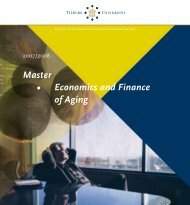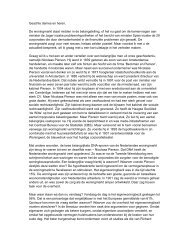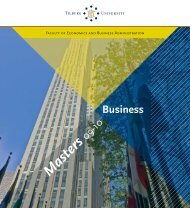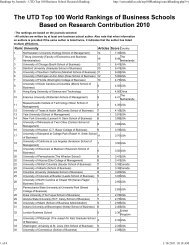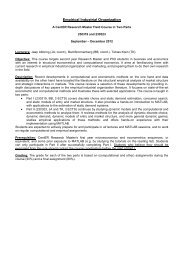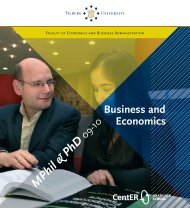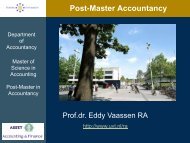Predicting the past - Tilburg University, The Netherlands
Predicting the past - Tilburg University, The Netherlands
Predicting the past - Tilburg University, The Netherlands
Create successful ePaper yourself
Turn your PDF publications into a flip-book with our unique Google optimized e-Paper software.
namely a greenhouse effect of 1.87 0 C, a solar radiation effect of 1.09 0 C, and a remainder<br />
term of 0.05 0 C. Hence, if aerosols and solar radiation had remained at <strong>the</strong> 1959 level,<br />
<strong>the</strong>n <strong>the</strong> expected global average temperature would have been 1.09 0 C higher. <strong>The</strong> solar<br />
radiation effect is <strong>the</strong>refore important, masking 58% of <strong>the</strong> increase due to <strong>the</strong> greenhouse<br />
effect. Ignoring dimming thus causes a serious underestimation of <strong>the</strong> greenhouse effect.<br />
Our results are alarming. Fortunately, we are now in an economic crisis: less production,<br />
less pollution, less global warming.<br />
Tennis<br />
Let us turn to a happier subject. It must have been in June 1992, during <strong>the</strong> period<br />
that I was working both in London and in <strong>Tilburg</strong>, that Eveline and I were watching <strong>the</strong><br />
tennis at Wimbledon on TV and listening to <strong>the</strong> BBC commentators. We discussed and<br />
subsequently kept a record of <strong>the</strong> statements made by <strong>the</strong> commentators, for example<br />
that serving with new balls provides an advantage, that a ‘winning mood’ exists, or that<br />
top players must grow into <strong>the</strong> tournament and that <strong>the</strong>y perform particularly well at <strong>the</strong><br />
‘big’ points. We wondered whe<strong>the</strong>r <strong>the</strong>se commonly accepted ideas were true or not, so I<br />
contacted IBM to give me <strong>the</strong>ir data, which <strong>the</strong>y did.<br />
Two years later, in 1994, I was joined by Franc Klaassen, <strong>the</strong>n a student here in <strong>Tilburg</strong>,<br />
now full professor at <strong>the</strong> <strong>University</strong> of Amsterdam. For almost twenty years we did<br />
research on tennis, first on <strong>the</strong>se accepted ideas, later also on o<strong>the</strong>r — statistically more<br />
demanding — aspects of tennis, such as <strong>the</strong> existence of winning mood, how efficient top<br />
players are, and how we can best predict <strong>the</strong> outcome of a match, while <strong>the</strong> match is in<br />
progress. In <strong>the</strong> end Franc and I wrote 15 papers toge<strong>the</strong>r, most but not all about tennis.<br />
Tennis research, like all sports research, may be considered a frivolous activity, and you<br />
may well wonder why <strong>the</strong> taxpayer should support scientists engaged in such activities.<br />
You are right, but only in part. Sports data have some characteristics that make <strong>the</strong>m<br />
ideally suited for studying human behavior. <strong>The</strong>y are clean — <strong>the</strong>re are few errors in <strong>the</strong><br />
data — and <strong>the</strong> data collection is transparent and can be checked. Data in economics,<br />
psychology, and many o<strong>the</strong>r sciences are often messy and ambiguous. For economists,<br />
psychologists and o<strong>the</strong>r scientists to work with clean data provides a great opportunity<br />
and a welcome change from normal practice. If results do not come out <strong>the</strong> way <strong>the</strong>y<br />
‘should’, <strong>the</strong>n this cannot be blamed on <strong>the</strong> data. <strong>The</strong>re must be a ‘real’ explanation and<br />
we have to find it. Maybe our preconceived idea is wrong or maybe we have not applied<br />
<strong>the</strong> correct statistical method.<br />
<strong>Predicting</strong> <strong>the</strong> <strong>past</strong> 21



